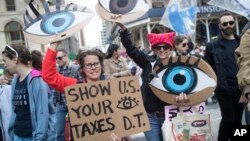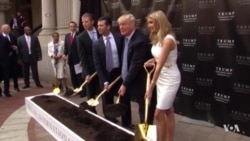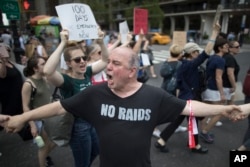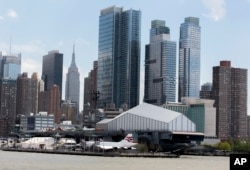“He's not welcome here.”
Like most New Yorkers, Amanda Johnson doesn't mince words. The “Resist Here” director for the Working Families Party is organizing a protest in advance of President Donald Trump's visit to New York City. The visit will be his first return to the city since taking office.
On Thursday, the president will meet with Australian Prime Minister Malcolm Turnbull aboard the USS Intrepid museum. The two will commemorate the 75th anniversary of the Battle of the Coral Sea, a World War Two naval battle during which the United States and Australia collaborated.
WATCH: New York Prepares for Trump's Return
A recent poll shows that Trump still retains strong support among those Americans who voted for him. In his hometown, though, the president's homecoming is likely to be met with protests from locals.
"New Yorkers, we value diversity. We value all the languages that are spoken all over the city. And his policies are to deport these folks that are our neighbors, and to take away the healthcare of our friends and our family, and we want to show him that that's not OK here," said Johnson.
New York's citizens take action
As of this writing, 2,200 New Yorkers had signed on for Thursday's protest, which was being organized with several other social justice organizations, like Women's March and Common Defense.
Johnson isn't the only New Yorker taking action. Sother Teague and Ravi DeRossi have opened the aptly-named Coup bar in Manhattan, where patrons can donate to non-profits they believe are endangered by the new administration.
"I wanted to do something," said DeRossi in an AP interview. "Bars, it's what I know how to do. And I think if everybody ... looks at their career or one of their hobbies, they could probably figure out how to turn that into something that is working toward a more positive, political environment."
Inside Coup, the walls display phrases lifted from protest signs, "I've seen better cabinets at Ikea" and "We are all immigrants." Of course, the sentiments conveyed are not necessarily felt by those outside New York.
"Donald Trump was essentially a rural candidate who appealed to many, many lightly-populated counties and some small cities," noted Mark Muro, senior fellow at the Metropolitan Policy program at Brookings Institution.
An election of economies
Trump won 2,584 counties to Hillary Clinton's 472 counties. Despite the broader representation, a Brookings analysis found counties won by Trump contributed only 36 percent to the country's overall GDP. Clinton won fewer counties, but these counties contributed 64 percent to the GDP.
In regions where local economies were largely built around natural resources and rural activity, faded opportunities and harsh economic realities explain why Trump's campaign promises to bring back jobs resonated so highly. Muro described the economic split represented in the last election as "incredibly stark."
"Our findings really underscored that we have two economies in this country, and two very different economic bases for the ways people make a living," Muro told VOA News. "We have big, dense, often urban economies, often high-tech, with people living in cities and following, essentially, professional pathways. And we have other less urban places in which people are living much less densely, much more rurally, often not working at all."
He added another observation. "What will be important now will be consensus around economic programs that benefit both sides of the urban-rural divide. I'm thinking of things like research money, I'm thinking of workforce-training money," said Muro. "These are things that benefit both urban communities and rural communities."
Back in New York City, resident sentiments have not changed since the November election, where Trump lost by a 4-to-1 margin.
"We value success and people that strive and go for their dreams. This city is a city of hustlers," acknowledged Johnson, "But from what I understand, the way that he's gotten to his success is by (treading) down on people, and that's not something we value."
Come Thursday, the same New York hustle and attitude that made "The Donald" famous will be there to greet him.















